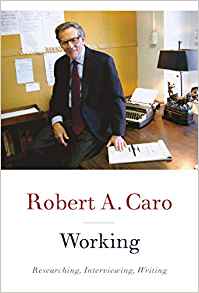Books |
Robert Caro: Working
By
Published: Jan 28, 2024
Category:
Memoir
I admire Robert Caro. I’m an evangelist for “The Power Broker,” his biography of Robert Moses, who singlehandedly shaped the infrastructure of New York City, brutalizing the powerless along the way. It’s 1,344 pages — 700,000 words. It used to be 1,050,000 words, but even Caro agreed that was long. [To buy it from Amazon, click here.] I haven’t read the four volumes of Caro’s Lyndon Johnson biography — he’s now working on the fifth — but if you’ve got the time, you might start with “The Path to Power (The Years of Lyndon Johnson, Volume 1).” [To buy the paperback from Amazon, click here.]
These books have made Caro the most acclaimed non-fiction writer in America. He has won the Pulitzer Prize for Biography — twice. He has won the National Book Critics Circle Award — three times. And the Gold Medal in Biography from the American Academy of Arts and Letters. And, in 2010, he received the National Humanities Medal from President Barack Obama.
“Working” is short: 207 pages. But it is the deepest book I’ve read in a long while, and it gives me fresh reasons to admire Caro: his dedication, his character. It tells the story of his work methods — years and years of research, years and years of writing and rewriting. But more, this is a book about a writer’s soul, about the need to know everything before his fingers touch a keyboard. And why? Because Caro’s subject is power. Local power for Moses, national power for Johnson. These are neither admiring portraits or demolition jobs. They are deep dives into the workings of power: how people get it, how they use it, and who they hurt along the way. That last purpose — who they hurt — may be the biggest reason for Caro’s obsessive investigations. He knows what others forget or ignore: History may be written by the winners, but it’s made on the backs on the losers.
Early on, a newspaper editor assigned Caro to investigative work.
“But I don’t know anything about investigative reporting,” Caro said.
The editor looked at Caro for a very long time. “Just remember,” he said. “Turn every page. Never assume anything. Turn every goddamned page.” He did. He still does. “Working” tells you how and why. And it’s beautifully written. [To read an excerpt of “Working,” click here. To buy the book, click here. For the Kindle edition, click here.]
Consider Lyndon Johnson. He was raised in the Hill Country of Texas, as lonely a region as you’ll ever see. His grandfather lost the family farm. His father bought it back. He paid too much. And by then, the land wasn’t good. So he too lost the farm — and the family was now desperately poor. Why was Lyndon Johnson such a master counter of votes in the House and Senate? Here’s an explanation only Caro found:
When he was young — seventeen and eighteen years old — Lyndon Johnson worked on a road gang that was building a highway (an unpaved highway: roads in the isolated, impoverished Texas Hill Country weren’t paved in the 1920s) between Johnson City and Austin. With little mechanical equipment available, the road was being built almost entirely by hand, and his job was “driving” a “fresno,” a heavy two-handled metal scoop with a sharpened front edge, that was pulled by four mules. Standing behind the scoop, between its handles, as the mules strained forward to force the scoop through the hard Hill Country soil, he would push as they pulled. Since he needed a hand for each handle, the reins were tied together and wrapped around his back — Lyndon Johnson was, really, in harness with the mules.
Decades after Johnson’s death, Caro and his wife and researcher, Ina, moved to the Hill Country. Caro had some admiration for Sam Johnson, Lyndon’s father. Then Lyndon’s cousin Ava becomes so exasperated with Caro’s inability to grasp what she is saying about the Hill Country that she has to show him:
We drove out to the Johnson Ranch and you got there and that grass-covered landscape looks beautiful, and fertile. And she said, “Now, get out of the car.” I got out of the car. Ava was an old woman but a very forceful woman. She said, “Now kneel down,” and I knelt down, and she said, “Now stick your fingers into the ground.” And I stuck my fingers into the soil and I couldn’t even get them into the ground the length of my finger. There was hardly any soil on top of that rock. There was enough to grow the beautiful grass but not enough to grow cotton or graze cattle. Ava said to me, “Do you understand now? Sam didn’t really see. He didn’t want to see. It looked so beautiful.”
Lyndon Johnson saw. He dealt in reality. And political loyalty — absolute, measurable loyalty. And because he knew how his colleagues would vote, he became the most powerful politician of his time.
Facts. They matter. You don’t have to be a writer to be inspired by this book.


